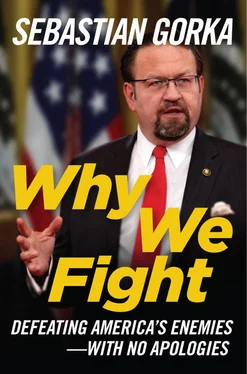Dave:So you would say, or at least if you had to guestimate basically what he believes, you would say that he believes that still keeping us there at the moment is still accomplishing …
Sebastian Gorka:Oh yeah, I don’t have the guestimate. I can tell you that.
Dave:So you believe that as well, because it seems unclear to me …
Sebastian Gorka:He will never, this seventy-one-year-old man who is now the most powerful man in the world, will never, ever buy into a nation-building scenario anywhere outside of the United States. It’s not happening for the next seven years. And that idea that you have some of my followers on Twitter tearing their hair out that “Bolton’s going to have us invade Syria.” Guys, get a grip on reality and stop talking about “crisis actors” and similar tin-foil-hat garbage. It’s not going to happen while the president is the president.
Dave:Well I tweeted something to that effect the day of the Bolton thing because it also reminds me that to understand basic deterrence, that you have to bring in people that, you know, talk a big game so that …
Sebastian Gorka:North Korea! Hello! The man who was “going to take us to war,” what did he do? I think the success in North Korea today has in large part been thanks to his tweets, because that’s how you deal with dictators. You make fun of them. They hate that and then you ridicule them. And then what? You scare them. Oh, and lo and behold, they want to negotiate for the first time in sixty-five years. Well, isn’t that interesting?
Dave:Do you think there’s any chance [Kim] would give up his nukes?
Sebastian Gorka:About three percent.
Dave:Because at that point what leverage does he have left, right? But you still think it’s worth having the talks to figure out what we can do.
Sebastian Gorka:Absolutely, because what’s happened for the last twenty-five years? Escalation, escalation, escalation. I mean we have given in to nuclear blackmail since Bill Clinton. So at the end of the day, we have to remember that 1953 was not a peace treaty. 1953 in Korea was a ceasefire and an armistice. That is actually a war that has simply been frozen for sixty-five years. It would be nice to have a little bit of a peace treaty or something!
Dave:How much of what’s happening in the world right now—you must be thrilled I assume with everything going on at the UN. Nikki Haley has basically walked in there, and she strikes me, I almost wonder did Trump really know what he was getting with her fully? Do you know her at all? Where do you think that comes from?
Sebastian Gorka:She found herself. She found herself, and more power to her.
Dave:What usefulness do you see in the UN at this point? Truly it is the most corrupt, backwards …
Sebastian Gorka:Look, the idea was a good idea in 1945 in San Francisco. Let’s have an organization that stops us from killing sixty million people again, but when you lock in dictatorships like China and Russia on the Security Council, with veto power, and then you create this empire of UN organizations…. I mean has there been a year in the last twenty years that we haven’t seen a UN scandal, whether it’s money-for-oil, whether it’s UN troops raping children in Africa? Have we seen one year without a UN scandal? I don’t think so. So try and reform, and if you can’t question the validity of what it does. I’m not talking about the children’s rights organizations and food security. I’m talking about its main mission, which was stability and safety. It’s failed abysmally.
Dave:What do you make of the endless obsession with Israel? That something like forty-seven of the last fifty-one resolutions are against Israel and usually voted on by countries…
Sebastian Gorka:I’m sorry, but that alone is a reason to dissolve the UN. What a lack of a moral compass. What an utter bankruptcy of their morality that there are nations in the world that actually still have slavery going on. Slavery! Where basic human rights for individuals are not guaranteed based upon sex, based upon lifestyle choices, and you’re going to lambast Israel, the only real democracy in the Middle East? Yes, I think you nailed it. That in itself is reason to question the future of the UN.
Dave:So is the US sort of in an odd position where if we don’t do anything nothing can get done, and that then puts us endlessly in these quagmires, or at least in these positions where we can either watch the world burn or get involved in things where we may end up adding to the burning in the first place?
Like, for example, with Russia going into Crimea. You know, [the Crimeans] gave up their weapons and they said, “Okay, NATO is going to take care of us,” but what that really means is the United States is going to take care of you, and I’m not saying we should have gone in and done anything there, but that we’re in this endless situation now where it is either us—there is no international fighting force, really—right?
Sebastian Gorka:But again you have to be super careful not to get caught in a binary dichotomy. You can absolutely say a world without American leadership is a more dangerous world, because it was for the last eight years. We had a government that actually said “We’re going to lead from behind,” which is an oxymoron. You cannot lead from behind. “We’re going to have strategic patience,” which means we do nothing and allow others to act. What happened? You name it. From China building fake military bases on fake islands to ISIS to Russia invading Ukraine. It was just a disaster.
Dave:Egypt, we backed the guy, then we backed the other guys, then we backed the other guys!
Sebastian Gorka:To say that a world without American leadership is more dangerous is true, but that doesn’t mean that we have to fix everybody’s problem, and that’s where smart strategy comes in.
We have a moral duty to espouse certain values, but that doesn’t mean we are responsible for all human beings, because the American Revolution says the opposite. Each nation is responsible. Their citizens are responsible. If you don’t like your system, do something about it. We did against the most powerful empire in the world. So again, it’s about finding that happy medium in the middle and being smart about it and, again, without being callous, just being realistic. There are atrocities everywhere from Rwanda to Yugoslavia, but are American taxpayers going to pay for fixing all of them? Are we responsible? Are they responsible for what’s happening in their country? Sure. Are there times when we could perhaps help them? Uh-huh, but it’s a balance.
Dave:So let’s shift back to your book Defeating Jihad .
It seems to me that the main sort of narrative on this out there is not that we can defeat it but we should live with it, which is don’t carry knives in London, and we’re going to put up more barricades so that trucks can’t be driven into buildings or into shopping centers or just down the street and killing people. That we can’t really defeat this ideology; we just have to manage it. I suspect that you do not agree with that premise.
Sebastian Gorka:No, because we’ve defeated ideologies before.
Look, there are idiots who run around with swastika armbands today. So Nazism hasn’t disappeared, but we have made it so anathema that if you walk down the street with a Nazi flag, you will be rejected by society instantly. The same thing with the KKK. Sadly, not with Che Guevara, or the hammer and sickle, but there are ways to defeat ideologies or to put them in a box where they’re laughable and everybody shuns them. We have to do the same thing with jihadism. This is my argument. This is the conclusion of the book. We have to be as effective at delegitimizing the message of jihad. Very simply put, killing jihadis is great, but at the end of the day, body bags as a metric, that’s not a good metric. It didn’t work in Vietnam, and it doesn’t work today, because if you’ve got a recruiting pool that’s massive, they’ll just recruit more jihadis.
Читать дальше












